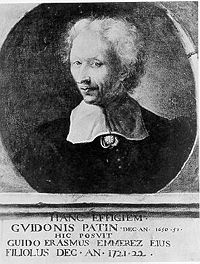
Guy Patin
Encyclopedia

Hodenc-en-Bray
Hodenc-en-Bray is a small village in northern France. It is designated municipally as a commune within the département of Oise.-References:*...
, Oise
Oise
Oise is a department in the north of France. It is named after the river Oise.-History:Oise is one of the original 83 departments created during the French Revolution on March 4, 1790...
– 1672 in Paris
Paris
Paris is the capital and largest city in France, situated on the river Seine, in northern France, at the heart of the Île-de-France region...
) was a French
France
The French Republic , The French Republic , The French Republic , (commonly known as France , is a unitary semi-presidential republic in Western Europe with several overseas territories and islands located on other continents and in the Indian, Pacific, and Atlantic oceans. Metropolitan France...
doctor and man of letters.
Guy Patin was headmaster of the School of Medicine in Paris
Paris
Paris is the capital and largest city in France, situated on the river Seine, in northern France, at the heart of the Île-de-France region...
(1650-1652) and professor in the Collège de France
Collège de France
The Collège de France is a higher education and research establishment located in Paris, France, in the 5th arrondissement, or Latin Quarter, across the street from the historical campus of La Sorbonne at the intersection of Rue Saint-Jacques and Rue des Écoles...
starting in 1655. His scientific and medical works are not considered particularly enlightened by modern medical scholars (he has sometimes been compared to the doctors in the works of Molière
Molière
Jean-Baptiste Poquelin, known by his stage name Molière, was a French playwright and actor who is considered to be one of the greatest masters of comedy in Western literature...
). He is most well known today for his extensive correspondence: his style was light and playful (he has been compared to early 17th century philosophical libertine
Libertine
A libertine is one devoid of most moral restraints, which are seen as unnecessary or undesirable, especially one who ignores or even spurns accepted morals and forms of behavior sanctified by the larger society. Libertines, also known as rakes, placed value on physical pleasures, meaning those...
s) and his letters are an important document for historians of medicine
History of medicine
All human societies have medical beliefs that provide explanations for birth, death, and disease. Throughout history, illness has been attributed to witchcraft, demons, astral influence, or the will of the gods...
.
Sources
- Gustave Vapereau, Dictionnaire universel des littératures, Paris, Hachette, 1876, p. 1554.
- Thèse de l’École des chartes de Laure Jestaz (2001)
- Françoise Waquet, Guy et Charles Patin, père et fils, et la contrebande du livre à Paris au XVIIe siècle in Journal des savants, 1979, n°2. pp. 125-148.

